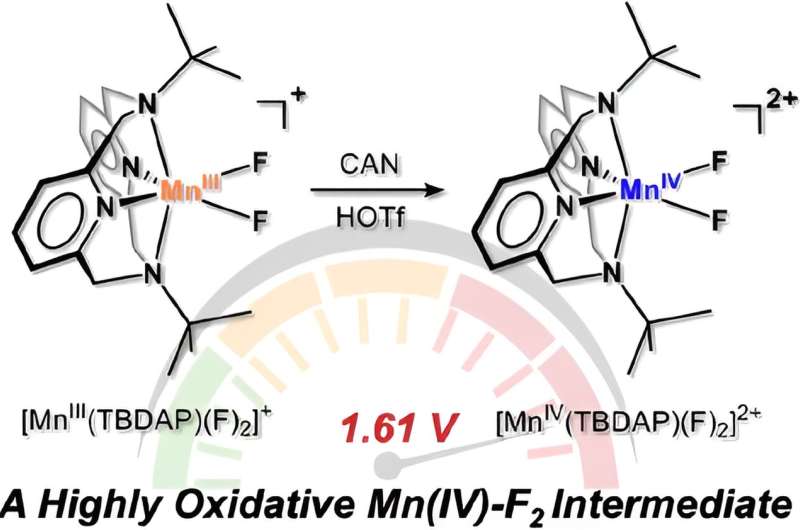
[ad_1]

Graphical summary. Credit: Journal of the American Chemical Society (2024). DOI: 10.1021/jacs.3c13324
A UNIST-affiliated research team has unveiled a state-of-the-art catalyst with extraordinary oxidizing power, capable of extracting electrons from compounds. Expected to revolutionize various fields, including the development of metal catalysts and synthetic chemistry, this catalyst marks a major breakthrough in catalysis research.
Led by Professor Jaeheung Cho in UNIST’s Department of Chemistry, the research team successfully synthesized a manganese-fluorine catalyst using the Macrocyclic Pyridinophane system. It shows the ability to induce catalysis. Oxidation reaction, facilitating efficient electron loss from toxic toluene derivatives. Is published I Journal of the American Chemical Society.
Through meticulous analysis, the research team has uncovered the underlying mechanisms responsible for the catalyst’s exceptional performance in oxidation reactions. By modulating the electronic environment of various compounds, the team confirmed the catalyst’s ability to catalyze the oxidation of toluene derivatives with unprecedented efficiency.
This research represents the first exploration of the physicochemical properties of transition metal-fluorine species, introducing a new model for carbon-hydrogen bond decomposition based on electron transfer reactions.
Professor Chu emphasized the importance of activation. Organic matter Carbons with strong hydrogen bonds, characterized by their tendency to accept electrons and undergo reduction through more reduction potential chemical reactions. The unique properties of manganese fluorine species enable catalytic transformations in this context.
The development of organic catalysts through carbon-hydrogen (CH) bond activation is an important research area with wide applications in pharmaceutical and industrial processes. Efforts are underway to develop cost-effective metallocatalysts by simulating the activities of diverse metalloenzymes through biosimulation research.
Recent attention has been directed towards metal halide materials that combine Transition metals Halogen atoms such as iron and manganese, especially fluorine, act as intermediates to oxidize a variety of organic substances. The newly synthesized manganese-fluorine catalysts emerge as the most reactive metal-halide species to date, offering promising applications in industrial processes.
The research team analyzed the oxidation mechanism facilitated by the catalyst, which increases the reaction rate by manipulating the electronic environment of various compounds. gave actionableAlso noteworthy is its remarkable efficiency in oxidizing toluene derivatives, a feat not previously seen with existing metal halide species.
The study was co-authored by researchers Donghyun Jeong and Yujeong Lee under the guidance of Professor Chu. Research not only advances carbon-neutral technologies, but also contributes to the development of the next generation of academics and important advances in environmental and industrial fields.
More information:
Donghyun Jeong et al, Synthesis, Characterization and Reactivity of a Highly Oxidative Mononuclear Manganese(IV)-Bis(Fluoro) Complex, Journal of the American Chemical Society (2024). DOI: 10.1021/jacs.3c13324
Reference: Researchers synthesize a new manganese-fluorine catalyst with exceptional oxidizing power (2024, February 20) https://phys.org/news/2024-02-manganese-fluorine-catalyst-exceptional February 20, 2024 Retrieved from -oxidizing.html
This document is subject to copyright. No part may be reproduced without written permission, except for any fair dealing for the purpose of private study or research. The content is provided for informational purposes only.
[ad_2]


